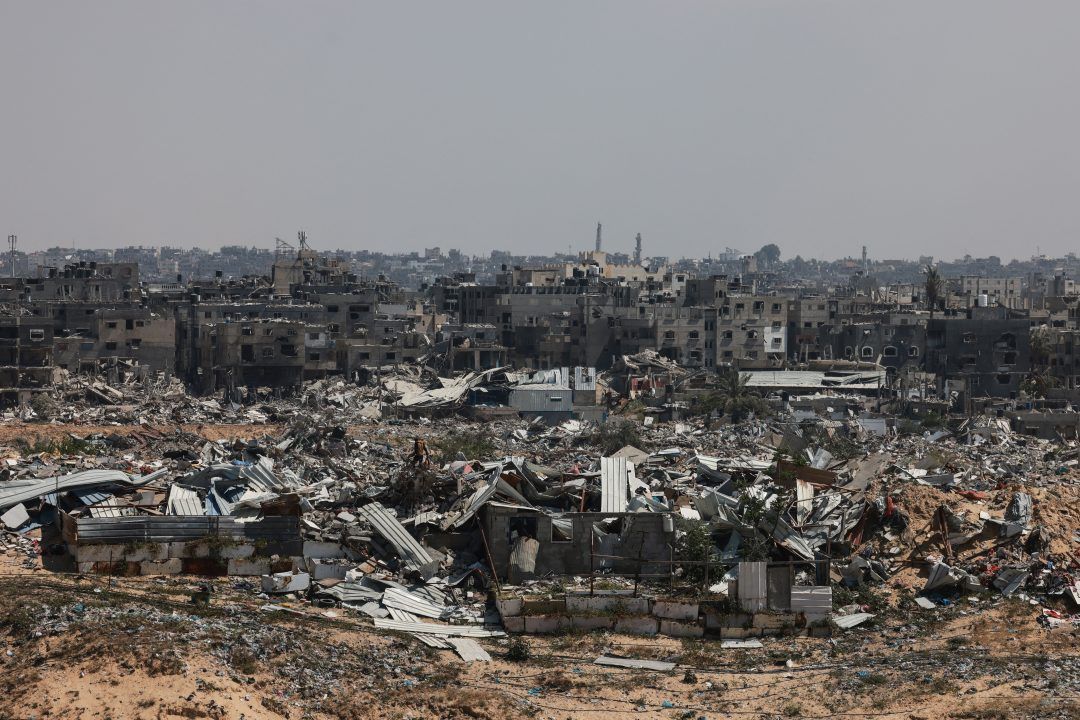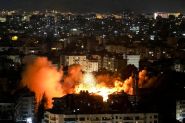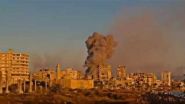- Home
- War in the Middle East
- Israel Prepares Ahead of Rafah Invasion, as Cairo Talks Continue

©<em>A man searches through rubble amid the devastation caused by months of Israeli bombardment in Khan Yunis, on April 7, 2024, after Israel withdrew its ground forces from the southern Gaza Strip. (MOHAMMED ABED / AFP)<em>
Israel continues strikes in Gaza on Tuesday as it begins preparations ahead of a future Rafah invasion, whilst Cairo negotiations continue.
Israel bombed targets in Gaza on Tuesday after Prime Minister Benjamin Netanyahu insisted the army will destroy Hamas despite ongoing Cairo talks toward a ceasefire and hostage deal.
More than six months into the war, Hamas said it was "studying" a new proposal for a temporary truce, submitted during the talks with US, Qatari and Egyptian mediators.
Under the plan, fighting would stop for six weeks, 40 women and child hostages would be exchanged for hundreds of Palestinian prisoners, and up to 500 aid trucks would enter Gaza per day, a Hamas source said.
Netanyahu stressed -- despite growing pressure from top ally the United States -- that Israel would pursue the twin goals of bringing home the hostages and destroying Hamas after its October 7 attack.
He said Israeli forces would storm Gaza's far-southern city of Rafah on the Egyptian border, despite global concern for the fate of up to 1.5 million Palestinians sheltering there.
[readmore url="https://thisisbeirut.com.lb/world/243234"]
Israel is blocking far more convoys carrying food aid within Gaza, where famine is looming, than convoys carrying other kinds of aid, the UN said on Tuesday.
A spokesman for the United Nations' humanitarian agency pointed to statistics from March showing that it was much more difficult to get clearance for delivering food than other aid in the war-ravaged Palestinian territory.
"Food convoys that should be going particularly to the north, where 70 percent of people face famine conditions, are... three times more likely to be denied than any other humanitarian convoys with other kinds of material," Jens Laerke told reporters in Geneva.
Israel, under intense US pressure to step up aid deliveries, allowed in 419 aid trucks on Monday, a daily record since the start of the war, said the Israeli defense ministry body COGAT.
The Israeli Prime Minister said: "This victory requires entry into Rafah... it will happen -- there is a date," he vowed without saying when he plans to send troops into the city.
Israel has invited tenders for 40,000 large tents, according to a document on the defense ministry website -– part of its preparations to evacuate Rafah ahead of an offensive, a government source told AFP on condition of anonymity.
The carnage left by the bloodiest ever Gaza war was on display in the southern city of Khan Younes, a wasteland of shattered buildings and mountains of rubble after months of heavy bombardment and street fighting.
As Palestinians readied for Wednesday's Eid al-Fitr holiday marking the end of the fasting month of Ramadan, they were stunned at the apocalyptic sight of hundreds of gutted or collapsed buildings, bomb craters and tank tracks in the sand.
The war broke out with Hamas's October 7 attack against Israel, which resulted in the deaths of 1,170 people, mostly civilians, according to Israeli figures.
Palestinian militants also took more than 250 hostages, 129 of whom remain in Gaza, including 34 the army says are dead.
Israel's retaliatory offensive has killed at least 33,207 people in Gaza, mostly women and children, according to the Gaza health ministry.
The army said on Tuesday that it had destroyed "terrorist infrastructure" throughout Gaza and an "aircraft eliminated a terrorist in Khan Younes who participated in the October 7 massacre."
A UN team on Monday inspected Al-Shifa hospital, Gaza's largest, which was mostly destroyed in two weeks of fierce fighting which the army said targeted militants holed up inside.
Israel's army said a projectile targeted its southern port city of Eilat on Monday but was intercepted by its new naval C-Dome missile defense system without causing casualties.
Belal Al-Sabbagh and Ilan Ben Zion, with AFP
Israel bombed targets in Gaza on Tuesday after Prime Minister Benjamin Netanyahu insisted the army will destroy Hamas despite ongoing Cairo talks toward a ceasefire and hostage deal.
More than six months into the war, Hamas said it was "studying" a new proposal for a temporary truce, submitted during the talks with US, Qatari and Egyptian mediators.
Under the plan, fighting would stop for six weeks, 40 women and child hostages would be exchanged for hundreds of Palestinian prisoners, and up to 500 aid trucks would enter Gaza per day, a Hamas source said.
Netanyahu stressed -- despite growing pressure from top ally the United States -- that Israel would pursue the twin goals of bringing home the hostages and destroying Hamas after its October 7 attack.
He said Israeli forces would storm Gaza's far-southern city of Rafah on the Egyptian border, despite global concern for the fate of up to 1.5 million Palestinians sheltering there.
[readmore url="https://thisisbeirut.com.lb/world/243234"]
UN accuses Israel of blocking food supplies
Israel is blocking far more convoys carrying food aid within Gaza, where famine is looming, than convoys carrying other kinds of aid, the UN said on Tuesday.
A spokesman for the United Nations' humanitarian agency pointed to statistics from March showing that it was much more difficult to get clearance for delivering food than other aid in the war-ravaged Palestinian territory.
"Food convoys that should be going particularly to the north, where 70 percent of people face famine conditions, are... three times more likely to be denied than any other humanitarian convoys with other kinds of material," Jens Laerke told reporters in Geneva.
Israel, under intense US pressure to step up aid deliveries, allowed in 419 aid trucks on Monday, a daily record since the start of the war, said the Israeli defense ministry body COGAT.
'Every home destroyed'
The Israeli Prime Minister said: "This victory requires entry into Rafah... it will happen -- there is a date," he vowed without saying when he plans to send troops into the city.
Israel has invited tenders for 40,000 large tents, according to a document on the defense ministry website -– part of its preparations to evacuate Rafah ahead of an offensive, a government source told AFP on condition of anonymity.
The carnage left by the bloodiest ever Gaza war was on display in the southern city of Khan Younes, a wasteland of shattered buildings and mountains of rubble after months of heavy bombardment and street fighting.
As Palestinians readied for Wednesday's Eid al-Fitr holiday marking the end of the fasting month of Ramadan, they were stunned at the apocalyptic sight of hundreds of gutted or collapsed buildings, bomb craters and tank tracks in the sand.
Air strikes, sniper fire
The war broke out with Hamas's October 7 attack against Israel, which resulted in the deaths of 1,170 people, mostly civilians, according to Israeli figures.
Palestinian militants also took more than 250 hostages, 129 of whom remain in Gaza, including 34 the army says are dead.
Israel's retaliatory offensive has killed at least 33,207 people in Gaza, mostly women and children, according to the Gaza health ministry.
The army said on Tuesday that it had destroyed "terrorist infrastructure" throughout Gaza and an "aircraft eliminated a terrorist in Khan Younes who participated in the October 7 massacre."
A UN team on Monday inspected Al-Shifa hospital, Gaza's largest, which was mostly destroyed in two weeks of fierce fighting which the army said targeted militants holed up inside.
Israel's army said a projectile targeted its southern port city of Eilat on Monday but was intercepted by its new naval C-Dome missile defense system without causing casualties.
Belal Al-Sabbagh and Ilan Ben Zion, with AFP
Read more



Comments